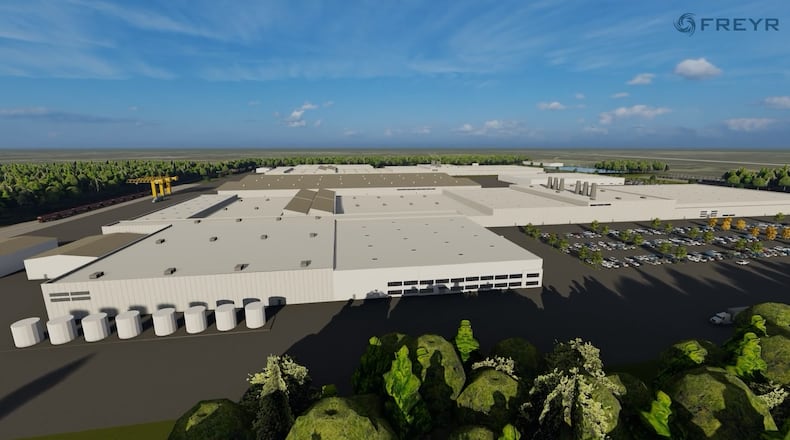One of Georgia’s high-profile clean energy projects is not moving forward.
Freyr Battery officials informed the Coweta County Development Authority late last month that the company will not move forward with its planned $2.6 billion factory in Newnan, roughly 40 miles southwest of downtown Atlanta. The Norwegian company planned to build battery energy storage systems — essentially massive battery complexes — to store electricity from solar arrays and other renewables.
Freyr announced the project at a 368-acre site in November 2022 amid a boom in battery and clean energy manufacturing projects coming to the state. Freyr’s Georgia factory plans came on the heels of announcements of multibillion-dollar electric vehicle factories from Rivian and Hyundai.
Freyr, founded in 2018, is a startup, and the company had yet to start construction on the facility since its initial announcement. In recent months, Freyr has shifted its business focus after buying a Texas solar module company.
“We are so grateful for the support and partnership we found in Coweta County and throughout Georgia,” a Freyr spokesperson told The Atlanta Journal-Constitution on Thursday. “However, as noted in our December release, we are focusing at the moment on the solar module manufacturing facility in Texas.”
The Georgia project’s cancellation was first reported Thursday by the Newnan Times-Herald after Freyr officials spoke at the Coweta development authority’s meeting earlier in the day.
Jason Peace, Freyr’s senior vice president of business development, told the board the change in plans was due to climbing interest rates, falling battery prices and corporate leadership changes.
“I was here, probably, what was it two years ago, super ambitious on building a battery plant here in the county,” Peace said, according to the Times-Herald. “But the reality is, we just can’t support that.”
State and local officials entered into an economic development agreement with Freyr to support the proposed 870,000-square-foot facility, which promised 723 jobs. For choosing Coweta County, Freyr was offered more than $358 million in grants, tax breaks and other incentives, a figure first revealed by the AJC in 2023.
A Georgia Department of Economic Development spokesperson told the AJC that the state’s incentive process protects taxpayers from failed projects because partner companies only receive the bulk of their tax savings upon delivering their development promises. The agreements also include claw back measures for awarded grants and other inducements.
“When a company’s plans change, that process ensures discretionary incentives are repaid,” the spokesperson said. “The company and state are working together to ensure that the state grant used for project site acquisition is repaid expeditiously.”
Global challenges
Freyr said in 2022 its customers include large industrial companies and solar developers looking to wean themselves off fossil fuels. One of its largest early investors was Koch Industries.
But inflation, high interest rates and intense competition, including from China, have been significant challenges for the company.
Freyr has yet to generate revenue, though the company has previously said it aimed to begin selling products and reaching profitability in this year.
Amid intense international competition, Freyr laid off workers in Europe and temporarily stopped battery production in August in Norway due to global market pressures, according to Norwegian news outlets.
Credit: Courtesy Freyr
Credit: Courtesy Freyr
Significant pressure has come from China, which has been pumping out cheap batteries. In an interview with the AJC ahead of the two year anniversary of the company’s Georgia factory announcement, Freyr’s then-CEO and co-founder Tom Jensen said the global Western powers need to establish their own battery production chain, which is a sentiment shared by federal and state leaders.
Jensen acknowledged the challenges but also continued opportunities.
“This is regional energy security, and it’s securing critical energy infrastructure for the energy transition,” Jensen said at the time. “If you rely upon or are making yourself reliant on imports of those solutions, that is a security issue potentially over time.”
At its Georgia factory, Freyr had said it planned to build clusters of batteries known as battery energy storage systems, or BESS.
BESS don’t generate electricity themselves; instead, they are charged with power from another energy source. In Georgia, they have typically been paired with solar. When the sun is shining but electricity demand is low, the battery systems can be charged so when demand spikes, their power can be pushed onto the grid instantly to meet the needs of homes and businesses.
Electric utilities around the country, including Georgia Power, have plans to add hundreds of megawatts of battery systems to their fleets in the coming years. By last summer, the U.S. electric grid had 20.7 gigawatts of BESS capacity online, according to the federal Energy Information Administration. A gigawatt is enough to power several hundred thousand homes.
Next steps
The development authority Thursday approved several documents to formally end Freyr’s project and its various local incentives.
The company agreed to pay back a $20 million grant that was approved by county leaders. It also said it will seek a new buyer for the 368-acre site, with Peace telling the board that there are interested parties.
“We do have a local, Georgia-area developer that’s looking to buy,” he said, according to the Times-Herald. “If everything goes well, it’ll be closed in a couple of weeks.”
Further derail on that potential project and the buyer were not disclosed.
The vast majority of the property tax breaks and other incentives would have been accrued over a 20-year period, so Freyr had yet to reap the bulk of its tax savings and inducements. Freyr asked the development authority for assistance in determining the financial compensation needed to repay the incentives it had so far accrued.
Sarah Jacobs, the head of the Coweta authority, called the situation “disappointing” but said it validates the method in which Georgia governments structure incentives.
“Both successful and unrealized projects highlight the value of this approach, as it ensures taxpayers are protected through built-in claw backs and safeguards,” she said.
Keep Reading
The Latest
Featured







